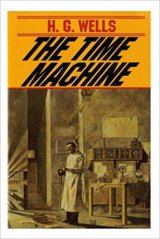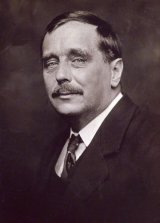The Time Machine Page #7
The Time Machine is a science fiction novella by H. G. Wells, published in 1895 and written as a frame narrative. The work is generally credited with the popularization of the concept of time travel by using a vehicle or device to travel purposely and selectively forward or backward through time.
“As they made no effort to communicate with me, but simply stood round me smiling and speaking in soft cooing notes to each other, I began the conversation. I pointed to the Time Machine and to myself. Then, hesitating for a moment how to express Time, I pointed to the sun. At once a quaintly pretty little figure in chequered purple and white followed my gesture, and then astonished me by imitating the sound of thunder. “For a moment I was staggered, though the import of his gesture was plain enough. The question had come into my mind abruptly: were these creatures fools? You may hardly understand how it took me. You see, I had always anticipated that the people of the year Eight Hundred and Two Thousand odd would be incredibly in front of us in knowledge, art, everything. Then one of them suddenly asked me a question that showed him to be on the intellectual level of one of our five-year-old children—asked me, in fact, if I had come from the sun in a thunderstorm! It let loose the judgment I had suspended upon their clothes, their frail light limbs, and fragile features. A flow of disappointment rushed across my mind. For a moment I felt that I had built the Time Machine in vain. “I nodded, pointed to the sun, and gave them such a vivid rendering of a thunderclap as startled them. They all withdrew a pace or so and bowed. Then came one laughing towards me, carrying a chain of beautiful flowers altogether new to me, and put it about my neck. The idea was received with melodious applause; and presently they were all running to and fro for flowers, and laughingly flinging them upon me until I was almost smothered with blossom. You who have never seen the like can scarcely imagine what delicate and wonderful flowers countless years of culture had created. Then someone suggested that their plaything should be exhibited in the nearest building, and so I was led past the sphinx of white marble, which had seemed to watch me all the while with a smile at my astonishment, towards a vast grey edifice of fretted stone. As I went with them the memory of my confident anticipations of a profoundly grave and intellectual posterity came, with irresistible merriment, to my mind. “The building had a huge entry, and was altogether of colossal dimensions. I was naturally most occupied with the growing crowd of little people, and with the big open portals that yawned before me shadowy and mysterious. My general impression of the world I saw over their heads was a tangled waste of beautiful bushes and flowers, a long neglected and yet weedless garden. I saw a number of tall spikes of strange white flowers, measuring a foot perhaps across the spread of the waxen petals. They grew scattered, as if wild, among the variegated shrubs, but, as I say, I did not examine them closely at this time. The Time Machine was left deserted on the turf among the rhododendrons. “The arch of the doorway was richly carved, but naturally I did not observe the carving very narrowly, though I fancied I saw suggestions of old Phœnician decorations as I passed through, and it struck me that they were very badly broken and weather-worn. Several more brightly clad people met me in the doorway, and so we entered, I, dressed in dingy nineteenth-century garments, looking grotesque enough, garlanded with flowers, and surrounded by an eddying mass of bright, soft-coloured robes and shining white limbs, in a melodious whirl of laughter and laughing speech. “The big doorway opened into a proportionately great hall hung with brown. The roof was in shadow, and the windows, partially glazed with coloured glass and partially unglazed, admitted a tempered light. The floor was made up of huge blocks of some very hard white metal, not plates nor slabs—blocks, and it was so much worn, as I judged by the going to and fro of past generations, as to be deeply channelled along the more frequented ways. Transverse to the length were innumerable tables made of slabs of polished stone, raised, perhaps, a foot from the floor, and upon these were heaps of fruits. Some I recognised as a kind of hypertrophied raspberry and orange, but for the most part they were strange. “Between the tables was scattered a great number of cushions. Upon these my conductors seated themselves, signing for me to do likewise. With a pretty absence of ceremony they began to eat the fruit with their hands, flinging peel and stalks, and so forth, into the round openings in the sides of the tables. I was not loath to follow their example, for I felt thirsty and hungry. As I did so I surveyed the hall at my leisure. “And perhaps the thing that struck me most was its dilapidated look. The stained-glass windows, which displayed only a geometrical pattern, were broken in many places, and the curtains that hung across the lower end were thick with dust. And it caught my eye that the corner of the marble table near me was fractured. Nevertheless, the general effect was extremely rich and picturesque. There were, perhaps, a couple of hundred people dining in the hall, and most of them, seated as near to me as they could come, were watching me with interest, their little eyes shining over the fruit they were eating. All were clad in the same soft, and yet strong, silky material. “Fruit, by the bye, was all their diet. These people of the remote future were strict vegetarians, and while I was with them, in spite of some carnal cravings, I had to be frugivorous also. Indeed, I found afterwards that horses, cattle, sheep, dogs, had followed the Ichthyosaurus into extinction. But the fruits were very delightful; one, in particular, that seemed to be in season all the time I was there—a floury thing in a three-sided husk—was especially good, and I made it my staple. At first I was puzzled by all these strange fruits, and by the strange flowers I saw, but later I began to perceive their import. “However, I am telling you of my fruit dinner in the distant future now. So soon as my appetite was a little checked, I determined to make a resolute attempt to learn the speech of these new men of mine. Clearly that was the next thing to do. The fruits seemed a convenient thing to begin upon, and holding one of these up I began a series of interrogative sounds and gestures. I had some considerable difficulty in conveying my meaning. At first my efforts met with a stare of surprise or inextinguishable laughter, but presently a fair-haired little creature seemed to grasp my intention and repeated a name. They had to chatter and explain the business at great length to each other, and my first attempts to make the exquisite little sounds of their language caused an immense amount of genuine, if uncivil, amusement. However, I felt like a schoolmaster amidst children, and persisted, and presently I had a score of noun substantives at least at my command; and then I got to demonstrative pronouns, and even the verb ‘to eat.’ But it was slow work, and the little people soon tired and wanted to get away from my interrogations, so I determined, rather of necessity, to let them give their lessons in little doses when they felt inclined. And very little doses I found they were before long, for I never met people more indolent or more easily fatigued.
Translation
Translate and read this book in other languages:
Select another language:
- - Select -
- 简体中文 (Chinese - Simplified)
- 繁體中文 (Chinese - Traditional)
- Español (Spanish)
- Esperanto (Esperanto)
- 日本語 (Japanese)
- Português (Portuguese)
- Deutsch (German)
- العربية (Arabic)
- Français (French)
- Русский (Russian)
- ಕನ್ನಡ (Kannada)
- 한국어 (Korean)
- עברית (Hebrew)
- Gaeilge (Irish)
- Українська (Ukrainian)
- اردو (Urdu)
- Magyar (Hungarian)
- मानक हिन्दी (Hindi)
- Indonesia (Indonesian)
- Italiano (Italian)
- தமிழ் (Tamil)
- Türkçe (Turkish)
- తెలుగు (Telugu)
- ภาษาไทย (Thai)
- Tiếng Việt (Vietnamese)
- Čeština (Czech)
- Polski (Polish)
- Bahasa Indonesia (Indonesian)
- Românește (Romanian)
- Nederlands (Dutch)
- Ελληνικά (Greek)
- Latinum (Latin)
- Svenska (Swedish)
- Dansk (Danish)
- Suomi (Finnish)
- فارسی (Persian)
- ייִדיש (Yiddish)
- հայերեն (Armenian)
- Norsk (Norwegian)
- English (English)
Citation
Use the citation below to add this book to your bibliography:
Style:MLAChicagoAPA
"The Time Machine Books." Literature.com. STANDS4 LLC, 2025. Web. 22 Jan. 2025. <https://www.literature.com/book/the_time_machine_159>.




Discuss this The Time Machine book with the community:
Report Comment
We're doing our best to make sure our content is useful, accurate and safe.
If by any chance you spot an inappropriate comment while navigating through our website please use this form to let us know, and we'll take care of it shortly.
Attachment
You need to be logged in to favorite.
Log In